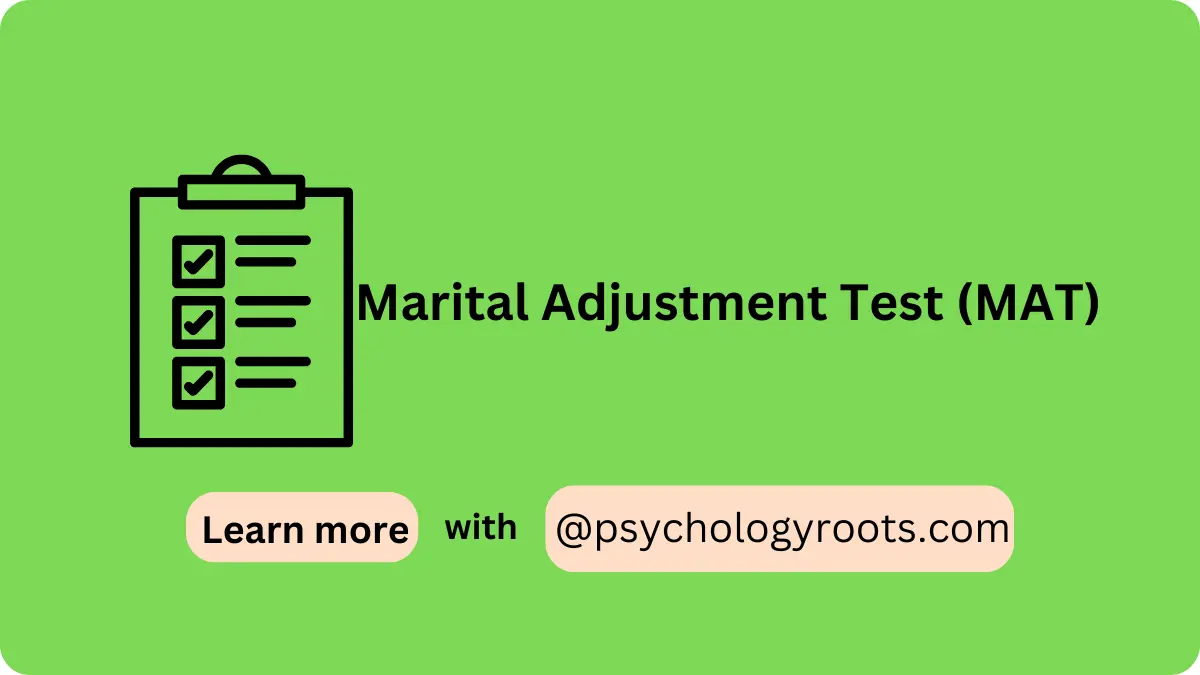Table of Contents
Marital Adjustment Test (MAT)
Here in this post, we are sharing the “Marital Adjustment Test (MAT)”. You can read psychometric and Author information. We have thousands of Scales and questionnaires in our collection (See Scales and Questionnaires). You can demand us any scale and questionnaires related to psychology through our community, and we will provide you with a short time. Keep visiting Psychology Roots.
About Marital Adjustment Test (MAT)
Scale Name
Marital Adjustment Test (MAT)
Author Details
Harvey J. Locke, Karl M. Wallace
Translation Availability
English

Background/Description
The Marital Adjustment Test (MAT) is one of the earliest and most widely used tools for assessing marital satisfaction and adjustment. Developed in 1959, the MAT was designed to predict the quality and longevity of marital relationships. It provides insight into the dynamics of a couple’s relationship by examining areas such as communication, conflict resolution, and mutual satisfaction.
The test has been pivotal in marital research and clinical applications, serving as a benchmark for understanding relationship dynamics. Modern adaptations, like the Couples Satisfaction Index, have refined the measurement process, improving the scale’s precision and validity.
Administration, Scoring and Interpretation
- Preparation:
- Provide each partner with the questionnaire to complete individually.
- Ensure a comfortable and private environment for honest responses.
- Instruction:
- Explain that the purpose is to assess the overall satisfaction and adjustment in their marital relationship.
- Assure confidentiality to encourage genuine answers.
- Completion:
- The MAT typically takes 5–10 minutes to complete.
- Respondents answer questions covering various aspects of marital life.
- Collection:
- Collect responses and prepare for scoring and interpretation.
Reliability and Validity
- Reliability:
- The MAT demonstrates high internal consistency, with reliability coefficients typically exceeding .85.
- Test-retest reliability is strong, reflecting stable assessments over time.
- Validity:
- The MAT shows good construct validity, correlating with other measures of marital satisfaction and adjustment.
- Predictive validity is supported by its ability to forecast marital outcomes like divorce or long-term satisfaction.
Available Versions
15-Items
Reference
Locke, H. J., & Wallace, K. M. (1959). Short marital-adjustment and prediction tests: Their reliability and validity. Marriage and family living, 21(3), 251-255.
Funk, J. L., & Rogge, R. D. (2007). Testing the ruler with item response theory: increasing precision of measurement for relationship satisfaction with the Couples Satisfaction Index. Journal of family psychology, 21(4), 572.
Important Link
Scale File:
Frequently Asked Questions
Q1: What is the purpose of the Marital Adjustment Test?
The MAT measures the overall satisfaction and adjustment in a marital relationship by examining areas like communication, conflict resolution, and mutual understanding.
Q2: How long does it take to complete the MAT?
The test typically takes 5–10 minutes to complete.
Q3: Is the MAT suitable for all couples?
The MAT is primarily designed for married couples but can also be adapted for long-term committed relationships.
Q4: Can the MAT predict divorce?
While the MAT is not explicitly designed to predict divorce, high or low scores can indicate the likelihood of marital satisfaction or challenges.
Q5: Are there modern alternatives to the MAT?
Yes, modern tools like the Couples Satisfaction Index (CSI) offer refined and precise measurements of marital satisfaction.
Disclaimer
Please note that Psychology Roots does not have the right to grant permission for the use of any psychological scales or assessments listed on its website. To use any scale or assessment, you must obtain permission directly from the author or translator of the tool. Psychology Roots provides information about various tools and their administration procedures, but it is your responsibility to obtain proper permissions before using any scale or assessment. If you need further information about an author’s contact details, please submit a query to the Psychology Roots team.
Help Us Improve This Article
Have you discovered an inaccuracy? We put out great effort to give accurate and scientifically trustworthy information to our readers. Please notify us if you discover any typographical or grammatical errors.
Make a comment. We acknowledge and appreciate your efforts.
Share With Us
If you have any scale or any material related to psychology kindly share it with us at psychologyroots@gmail.com. We help others on behalf of you.